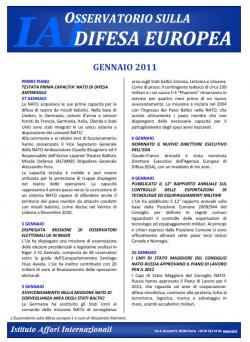Observatory on European defence, June 2002

17 June 2002
General Affairs Council – ESDP Operations Financing
The General Affairs Council, held in Luxembourg in preparation of the Seville Council, reached an agreement on the financing of ESDP military operations; the EU Treaty does not allow these operations to be charged to the Community budget.
Two categories of costs where established: common and individual. Common costs include the expenses for the commands of future operations led by the EU and the support of the forces. The “costs lie where they fall” principle, charging a single country directly for its own expenses, will be applied to all remaining categories.
The EU Council retains the power to decide on an ad hoc basis to include certain expenditures, such as transports, in common costs.
The long-awaited solution is a compromise between those countries more willing to “communitarise” their defence expenditure and those willing to adopt NATO’s “cost lie where they fall” rule; it helps only partially to solve the problem of ESDP financing.
A certain level of flexibility in the real application of the rule is guaranteed by the discretional power given to the Council.
The problem concerning incentives for the funding of ESDP’s military capabilities remains substantially unresolved.
22 June 2002
European Council – ESDP
The Report on ESDP presented by Spain was discussed by the European Council in Seville, held at the end of the Spanish Presidency.
The decision on ESDP financing taken by the General Affairs Council was confirmed, as were the measures already taken to develop military capabilities.
The discussion on the role of CFSP in the fight against international terrorism led to a declaration that includes this mission among ESDP goals.
A permanent agreement between NATO and EU has not yet been reached because of the long lasting standoff between Greece and Turkey.
The text adopted presents many annexes on cooperation with third countries and a declaration on Ireland’s neutrality, followed by an explanatory declaration by the Council.
The balance of the Spanish Presidency on ESDP is not completely positive, even if important steps were taken, regarding in particular financing rules and the development of some capabilities.
The relationship with NATO is probably the major concern, given the urgency to deploy the military force in the future. Moreover, the Greek leadership of the ESDP process for the next two semesters will probably not help bring a solution.
The inclusion of the fight against terrorism in CFSP and ESDP missions confirms the Union’s interdisciplinary answer to this threat; it represents a strong challenge to Europe and will require a process of adaptation of EU policies to the new strategic environment.
-
Details
Roma, Istituto affari internazionali, 2002 -
Issue
02/05


